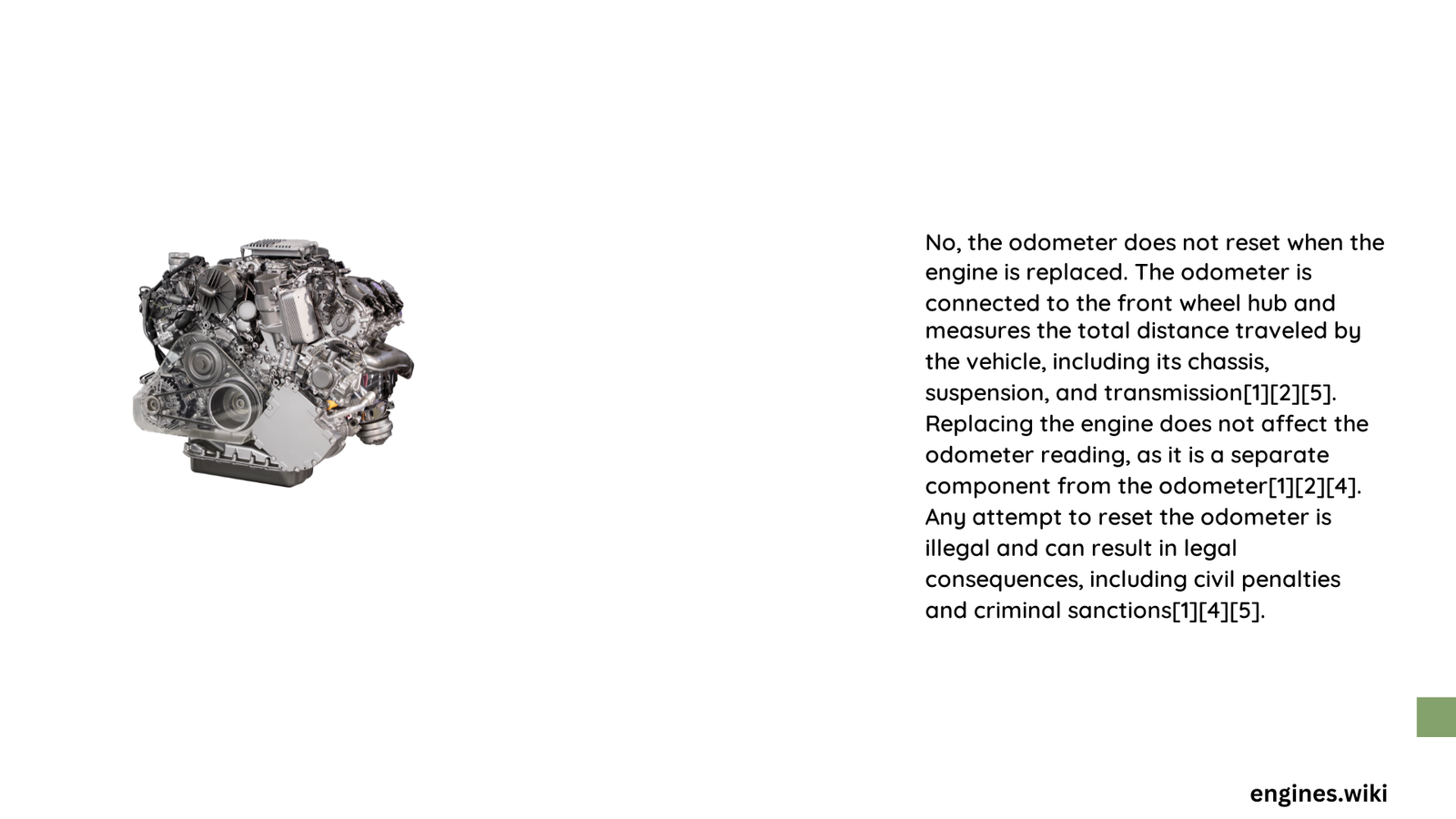When a vehicle undergoes an engine replacement, many car owners wonder about the impact on their odometer reading. Contrary to common misconceptions, the odometer does not reset when the engine is replaced. The total distance traveled by a vehicle remains recorded, regardless of engine changes, as the odometer is mechanically connected to the vehicle’s wheel hub, not the engine itself.
What Happens to Odometer When Engine is Replaced?
Vehicle owners often have misconceptions about how engine replacements affect mileage tracking. The fundamental truth is that the odometer continues to display the total distance traveled by the vehicle, irrespective of engine modifications.
How Does Odometer Tracking Work?
| Odometer Type | Tracking Mechanism | Impact of Engine Replacement |
|---|---|---|
| Mechanical Odometer | Connected to wheel rotation | No reset |
| Digital Odometer | Electronic pulse tracking | No reset |
| Modern Electronic Systems | Vehicle speed sensors | No reset |
Why Doesn’t the Odometer Reset?
The odometer’s primary function is to track the vehicle’s total distance traveled, which is independent of the engine’s condition. Key reasons include:
- Physical Connection: Odometers are linked to wheel hubs, not engine components
- Legal Requirements: Preventing mileage manipulation
- Vehicle History Preservation: Maintaining accurate maintenance records
Technical Insights into Odometer Functionality
Most modern vehicles use one of three primary odometer tracking methods:
- Mechanical Gear Systems
- Directly connected to transmission
- Measures wheel rotations
-
Unaffected by engine replacement
-
Electronic Pulse Tracking
- Uses vehicle speed sensors
- Calculates distance through electronic signals
-
Continuous tracking regardless of engine status
-
Integrated Vehicle Computer Systems
- Comprehensive mileage tracking
- Stores data independently of mechanical components
Legal and Ethical Considerations
Attempting to reset an odometer during engine replacement can lead to:
- Potential legal penalties
- Significant fines
- Reduced vehicle resale value
- Potential insurance complications
Documentation Recommendations
When replacing an engine, vehicle owners should:
- Maintain detailed service records
- Document exact mileage at time of engine replacement
- Consult certified mechanics
- Ensure proper registration of engine swap
Potential Exceptions and Rare Scenarios
While standard practice prevents odometer reset, extremely rare scenarios might involve:
- Specialized racing or competition vehicles
- Vintage car restoration projects
- Unique manufacturer-specific protocols
Expert Recommendations

Vehicle owners should:
– Understand odometer functionality
– Preserve maintenance documentation
– Work with certified automotive professionals
– Recognize that engine replacement does not alter mileage tracking
Common Misconceptions Debunked
- Myth: Engine replacement automatically resets mileage
- Fact: Odometer continues tracking total vehicle distance
- Myth: Mileage can be easily manipulated
- Fact: Modern systems have robust tracking mechanisms
Conclusion
An engine replacement represents a significant maintenance milestone but does not impact the vehicle’s recorded mileage. Vehicle owners can confidently proceed with engine swaps, knowing their odometer will continue accurately tracking total distance traveled.
Technical Expertise
This comprehensive guide is based on automotive engineering principles and current industry standards for vehicle mileage tracking.
Final Takeaway
Your vehicle’s odometer remains a reliable record of its journey, engine replacement notwithstanding.
References:
– CarTitles.com – Engine Replacement and Odometer
– Orthodox Auto Co. – Mileage Tracking
– Car From Japan – Odometer Functionality
